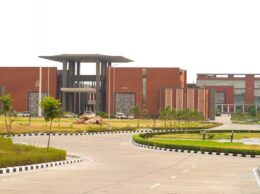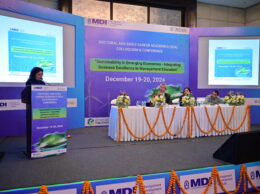By Lokesh Payik, Bangalore: Manufacturers today are presented with the opportunity to leverage the technologies driving the fourth industrial revolution – flexible productions systems, additive manufacturing, artificial intelligence, new business models such as machines as a service, autonomous robots, and augmented reality to name a few. The onset of Industry 4.0 has triggered an extensive digital transformation across leading global industries. Increasing productivity and efficiencies leading to improved customer experience has encouraged industry to push for technological innovation and find solutions through robotics, automation, cloud computing, 3D printing, Internet of Things, machine to machine and human to machine learning. During the next five to ten years, Industry 4.0 will be embraced by more companies, boosting productivity across all manufacturing sectors. Productivity improvements on conversion costs, which exclude the cost of materials, will range from 15 to 25 percent.
Some sources expect disruptive improvements in terms of quality, productivity and customer orientation; others are concerned with job losses, high costs for investments and data security. Leading players are already reaping the benefits of digitizing their functions and processes. As an outcome, manufacturers will witness significant productivity gains that might lead to perception of less number of workers. However, it is anticipated that most job losses will occur due to computerization of routine jobs and introduction of robots on the shopfloor. Simple, mundane tasks are rapidly being replaced by machines due to the standardization they bring in.
Computers and robots have made remarkable advances into the workforce in recent years, not only on the factory floor but also in law offices, banks and motor vehicles. Not that it’s the first time technology has replaced humans in the workplace. Mechanical looms took the place of artisans 200 years ago. The rise of personal computers reduced the need for secretaries 30 years ago. These advances in automation took a toll on specific professions and industries but raised our living standards overall.
There will be new opportunities created as the Internet of Things takes hold. The worker who uses her hands to mold a specific engine part will soon do the same thing in an augmented or virtual reality space. The employee placing warehouse boxes on extremely tall stacks will use a joystick to aim the forklift.
The great part is that current job skillsets may just need an upgrade rather than a complete overhaul. For instance, augmented reality technology means that we will have a layer of computer technology over our current work environment, so the focus could be on integrating the interface into your job versus starting from scratch.
In other words, Industry 4.0 isn’t about the destruction of the previous eras. It is adapting previous tools, infrastructure and skills to take full advantage of the Internet of Things.
India has more than 50% of its population below the age of 25 and more than 65% below the age of 35. Ironically, while smart manufacturing is decreasing the number of labor intensive jobs on the shopfloor, it is driving the creation of more skilled, intelligent and evolved jobs. Unlike the popular perception of manufacturing as labour-intensive, Industry 4.0 is skill-intensive and demands a variety of skills even at the lowest level in the skill spectrum.
The fields of IT and software development are set to see a huge surge in job creation – with the increased need for IT solution architechts, user interface designers, embedded software engineers, data scientists. These jobs form the heart of the success story of adopting smart manufacturing. The shopfloor worker of the future will also be a digital native. Manufacturing methods and the exchange of information will need to be seamless with a clear digital footprint. Going forward, there will be a strong requirement to initiate and support this “digital employee”.
What’s needed most is for IT experts to gain insight into essential production processes so that they can identify how software solutions can best improve performance. For this reason, we are training IT experts in lean production and the Bosch production system principles.
There is an urgent need of specialists who are not only familiar with products and production lines but are also able to analyze huge quantities of data. There are new job opportunities who would use existing data to gain additional insights that are not yet available in many places (e.g. -correlations between individual steps in the production process) and to forecast future trends on the basis of historical data (e.g. malfunctions, scrap rates). This suddenly gives production planners the ability to proactively prevent problems instead of constantly being derailed by unforeseen problems and the urgent solutions they require.
One of the key aspects of Industry 4.0 thought process / guiding principle for us is to put more focus on the people who work in industry. All the solutions we have developed follow this principle. For example, data analytics is automatically looking for patterns in the data from production lines and then generating notifications for the production planner; instead of him having to proactively monitor production data.
Unlocking India’s latent potential through BRIDGE
The Government of India has taken decisive steps to boost manufacturing in India. The National Manufacturing Policy has set a target of 25% share of GPD from manufacturing by 2022 from the present 16-17%. The government has introduced the Make in India program which includes major new initiatives designed to facilitate investment, foster innovation, protect intellectual property and build best-in-class manufacturing infrastructure.
India is home to the nationally renowned Bosch Vocational Center (BVC), which has been imparting learning for over 55 years. With expertise in the manufacturing sector spanning decades, the Group decided to extend its domain knowledge to support needs beyond its own business requirements. Acting on this, Bosch’s Response to India’s Development and Growth through Employability Enhancement (BRIDGE) program was founded in 2013.
BRIDGE focuses on school dropout youth to ensure their job readiness for India’s growing services sector. The intent of this program is to reshape the lives of a section of society through education. The program provides on-the-job training and 100 percent placement assistance. So far, over 7,500 youth have been trained and placed across India in more than 125 BRIDGE centers operating in either Government I.T.I.s or Private Higher Secondary Schools / Pre-University Colleges.
Apprehensions and misconceptions are bound to arise with every major paradigm shift in industrial evolution. Digitization cannot be equated with loss of jobs. It should be seen as the incorporation of new skills and advanced competencies that enhance the aspirational value of manufacturing jobs.
About the Author: Evangelizing the digital revolution at Robert Bosch Engineering and Business Solutions, Lokesh Payik is the Chief of Business for Connected Industry (famously known as Industry 4.0 / Industrial IoT) for emerging markets. He is responsible for establishing and scaling up the business in India, Mexico, Turkey, South Africa and ASEAN countries. Lokesh has been instrumental in setting up the business leveraging Bosch competencies in manufacturing, IoT technologies, augmented reality, & user experience and now scaling up with customer centricity and a high performing team. Lokesh is a bachelor of technology from BVB College of Engineering – India and holds a master in business administration from La Trobe University, Australia.









